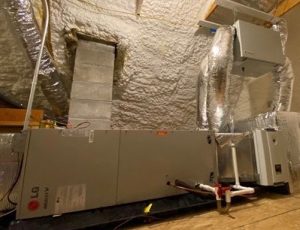April 16, 2020 Featured Product – HRV / ERV Systems
What Is An HRV / ERV System?
There are two types of mechanical ventilation systems: heat-recovery ventilators (HRV system) and energy-recovery ventilators (ERV system).
An HRV system consists of two air ducts: one that carries fresh air in and one that carries stale air out. Both incoming and outgoing air pass through a heat exchanger, a device that allows heat to transfer from one airstream to the other without the two airstreams actually coming in contact with one another. Depending on the temperature and humidity level during a particular time of year, the speed of the fan in each air duct can be adjusted so that the air brought into the house is more efficiently heated or cooled.
ERV systems work the same way HRVs do — one air duct pushes stale air out of your home while the other draws fresh air in — but ERVs also manage humidity. An ERV system can remove or retain humidity in your home by transferring moisture from one airstream to the other. An ERV’s humidity control function not only increases comfort but also keeps the heat exchanger core warmer, which helps it run more efficiently.
HRV Benefits
HRVs are able to remove stuffy air from rooms with limited air flow, like basements, laundry rooms, and bathrooms. They also drive fresh air into more frequently used rooms like bedrooms and living rooms to maximize comfort.
On a hot summer day, you can use an HRV to pre-cool the fresh air coming into your house through your air conditioning system.
In the winter, HRVs are able to recover heat energy through the heat exchanger to preheat the fresh air, which can help you cut heating costs.
Since the two airstreams never come in direct contact with one another in the heat exchanger, the incoming fresh air is not contaminated by the exhaust air.
ERV Benefits
An ERV system is most useful in areas with extreme weather — hot, humid summers and cold, dry winters.
In the summer, an ERV system can reduce humidity in your home, which helps prevent mold growth and keeps air feeling fresher.
In the winter, ERVs allow the air in your home to retain some moisture, which helps prevent dry skin and nosebleeds that can occur when the air is too dry.
Featured Product – Fantech 150 ERV
We are very excited to feature the Fantech 150 Energy Recovery Ventilator. This particular unit was recently installed into a client’s home and their satisfaction is worthy of five stars. Our client reports a fresh air feeling throughout their home with windows closed. She loves to cook and finds that strongest scents, such as curry or fish, no longer linger throughout the home. Another noteworthy point is that two large dogs reside in the home and the canine scent has disappeared from the living space. The most remarkable highlight of this unit is the effectiveness of the filter against seasonal allergens entering the home. Imagine experiencing the fresh spring air without the annoying allergies.

Features of the Fantech 150 ERV:
- Airflow up to 145 cfm @ 0.4″ Ps serves 2 to 5 bedroom homes
- Removable screw terminal for easy connection
- Compatible with Fantech’s low-voltage controls
- Three speed ventilation control
- Washable electrostatic filters
- Optional drain line
- Anti-microbial material
- Withstands freezing
- AHRI certified
Contact us to learn how you can have a home full of fresh pure air too!
Blog Archives
- February 2023
- January 2023
- October 2021
- September 2021
- February 2021
- August 2020
- July 2020
- April 2020
- March 2020
- February 2020
- October 2019
- March 2018
- February 2018
- November 2017
- August 2017
- April 2017
- March 2017
- February 2017
- January 2017
- September 2016
- January 2016
- June 2015
- April 2015
- March 2015
- February 2015
- January 2015
- August 2014
- May 2014
- April 2014
- March 2014
- February 2014
- November 2013
- August 2013
- July 2013
- June 2013
- May 2013
- April 2013
- March 2013
- February 2013
- January 2013
- December 2012
- October 2012
- August 2012
- June 2012
- May 2012
- April 2012
- March 2012
- February 2012
- January 2012
- December 2011
- November 2011
- October 2011
- September 2011
- August 2011
- July 2011
- June 2011
- April 2011
- February 2011
- January 2011
